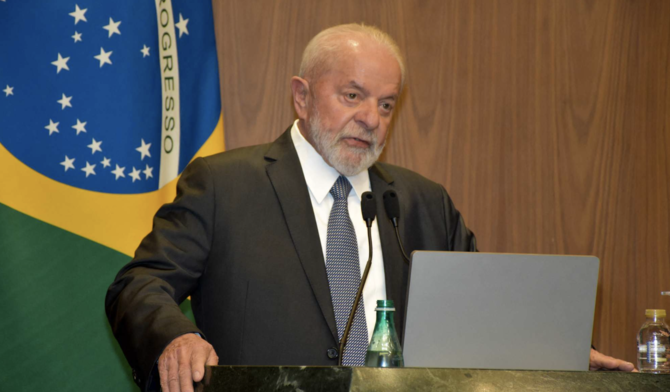Andrew Hammond
The reputation of Brazil, the largest and most influential country in Latin America, took a battering during the era of Jair Bolsonaro, its controversial former president. However, there are growing signs of a rebound in the nation’s popularity as it begins its stint as chair of the G20 for 2024.
One of the key catalysts for this significant change in fortunes was the return to office of President Luiz Inacio Lula da Silva in January last year. His “Brazil is back” slogan has been a key message during official visits to more than two dozen nations since his election victory, during which he held talks with more than 50 heads of state, including two kings and the pope.
Part of the reason for the generally positive reception Lula has received, despite some missteps along the way, is his climate diplomacy. His policies have helped to significantly reduce deforestation of the Amazon rainforest, the so-called lungs of the Earth, and rebuild the credibility of climate talks after the era of Bolsonaro, who was nicknamed the “Trump of the Tropics.”
One of Lula’s big ambitions is not just to boost his nation’s reputation on the world stage, but also to show that Brazil is once again an international leader. This coming week, the G20’s year begins in earnest with a meeting of foreign ministers, followed by a summit of finance ministers soon after. Lula is looking to use the powerful platform the year-long presidency of the G20 provides to further project his nation’s return to the global stage after years of self-inflicted international isolation.
Part of the reason that Brazil is once again being feted is its wealth of natural resources. Several global powers, including the EU and Japan, want to reach a trade deal with Lula and the leaders of the three other member nations of the Mercosur trade bloc, Argentina, Paraguay and Uruguay, to help diversify supply chains and reduce their reliance on China.
Brazil and the wider Latin American continent, home to half-a-billion people, have the world’s largest share of arable land, which provides an estimated 15 percent of global food production and 45 percent of net international agri-food trade. They also have huge amounts of other resources, including critical mineral deposits, and the largest share of renewables in the world. EU foreign policy chief Josep Borrell has even said the region has the potential to become the new Arabian Gulf, given its wealth of critical mineral assets, such as lithium.
Brazil also has a wider ambition, under Lula, to lead the developing nations of the Global South. While the country certainly boasts the strongest credentials of any Latin American nation in support of this aspiration, especially after its recent stint as chair of Mercosur, China and India also covet this leadership role and so Lula will have his work cut out.
Part of the challenge for Lula in realizing this ambition to lead the Global South is the changed geopolitical and geoeconomic contexts now compared with his first two terms in office, from 2003 to 2010. During that time, Brazil became a key voice for the developing world, while remaining independent on the world stage of both the US and China, partly through its membership of the prestigious BRICS group of developing nations. Now, though, the global landscape has become more complex, as tensions between the US and China continue to grow in the post-pandemic, post-Ukraine context.
Since 2010, when Lula left office last time, Brazil has become increasingly dependent on China specifically and Asia in general, with the huge region now the destination for about half of its exports. China alone, Brazil’s main trading partner, buys about two-fifths of Brazilian farm exports.
While Lula is unlikely to achieve all of his global leadership goals, the turnaround in Brazil’s fortunes has nevertheless been significant. He has already made much headway toward his goal of restoring his country’s reputation as a key emerging market and a modern, vibrant and stable democracy.
In 2010, the country had just experienced what in hindsight was a golden decade of solid growth and strong income redistribution. The economy was booming and the country was enjoying enhanced international prestige within BRICS. Finally, it seemed the nation could look forward to a prosperous future after overcoming the legacy of brutal military rule from 1964 to 1989. Yet, the subsequent period proved to be a deep disappointment that threatened the return to democracy.
It culminated in 2018 when Bolsonaro, a former army captain, rode a wave of populism with a platform that evoked nostalgia for the days of the former military dictatorship.
This, in addition to a host of policy positions that were controversial among many people, domestically and internationally, included a relaxing of gun laws and the shredding of environmental legislation, including Brazil’s commitment to the Paris Agreement on climate change.
Bolsonaro’s victory was set in the context of dented political and economic self-confidence in the country. The economy had endured its worst recession in decades, with Brazilian commodities losing significant value in international markets. By early 2016, the country had shed about 1.5 million jobs, inflation was in double digits, and its debt had been downgraded to junk status by major credit ratings agencies.
That same year, Rio de Janeiro became the first South American city to host the Olympics, which proved to be a troubled affair. Not only did the government have to make significant spending cuts to the games budget given the financial downturn, but an outbreak of the Zika virus also presented a major challenge.
Taking all of this together, the scale of these crises underline just how far Brazil has already come, reputationally, since Lula returned to office in 2023. While the full extent of his ambitions, particularly for the nation to lead the Global South, are unlikely to be realized, he has nevertheless largely turned the page on the political and economic troubles of the past decade.







